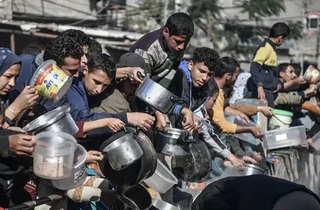UN humanitarians have urgently appealed to Israel to comply with international law to ensure the safe passage of lifesaving relief to the war-torn enclave.
According to the World Health Organization (WHO), more than four in five children in Gaza experienced an entire day without food at least once in the three days preceding a recent food insecurity survey. WHO spokesperson Dr. Margaret Harris emphasized the severity of the situation: "These are children under five who are not getting food all day. So, you ask, ‘Are the supplies getting through?’ No, children are starving."
The survey also revealed that almost all children in Gaza now consume only two different food groups per day, starkly below the WHO recommendation of at least five.
Since mid-January, over 93,400 children under five have been screened for malnutrition in Gaza. Among them, 7,280 were diagnosed with acute malnutrition, including 5,604 with moderate acute malnutrition and 1,676 with severe acute malnutrition, as per the UN aid coordination office (OCHA).
OCHA spokesperson Jens Laerke echoed these concerns, warning of the heightened risk of deadly malnutrition and famine among Gaza's most vulnerable populations. "They are certainly not getting the amount that they desperately need to prevent a famine, to prevent all kinds of horrors that we see. It’s very, very little that is going around at the moment," Laerke stated.
Laerke emphasized that Israel's legal obligation to facilitate aid delivery extends beyond merely dropping supplies at the border, as humanitarians cannot safely transport aid through active combat zones. "The aid that is getting in is not getting to the people," he added.
Amid ongoing reports of Israeli bombardment across Gaza, humanitarian agencies stressed the necessity of opening more land crossings for aid convoys to ensure timely and large-scale delivery. The recent damage to a US military-built floating dock off Gaza’s coastline further complicates aid logistics, although it was never intended to be a primary aid route.
In response to the escalating crisis, the WHO, in collaboration with partners and the local health authority, continues to offer stabilization services for children with severe malnutrition. However, the recent hostilities have rendered the nutrition stabilization centre in Kamal Adwan Hospital non-operational.
Since 1 May, the UN World Food Programme (WFP) and partners have reached around 60,000 children under five and 22,820 pregnant and breastfeeding women with 15 days' worth of nutrient supplements to combat malnutrition.
The UN's renewed appeal underscores the urgent need for a sustained and safe aid flow into Gaza to avert further humanitarian catastrophe. (ILKHA)



 Güncel
Güncel
 Güncel
Güncel
 Güncel
Güncel
 Dünya
Dünya
 Dünya
Dünya
 Ekonomi
Ekonomi
 Dünya
Dünya
 Dünya
Dünya
 Dünya
Dünya
 Güncel
Güncel





